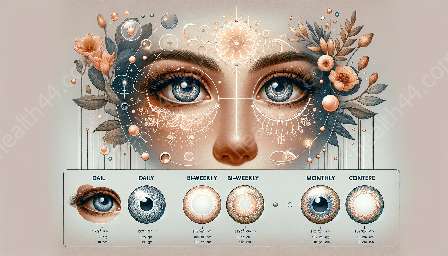When it comes to contact lens use, particularly for cosmetic enhancement, there are several ethical considerations that individuals and professionals need to take into account. This topic cluster will explore the ethical implications of using contact lenses for cosmetic purposes, in relation to contact lens fitting and evaluation.
Understanding Cosmetic Contact Lens Use
Contact lenses have long been used not only for vision correction but also for cosmetic enhancement. Colored and special-effect contact lenses are popular among individuals who wish to change or enhance the appearance of their eyes. However, the ethical considerations surrounding the use of contact lenses for cosmetic purposes are significant and require careful examination.
Risks and Benefits Evaluation
One of the primary ethical considerations in the context of cosmetic contact lens use is the assessment of risks and benefits. Contact lenses, whether prescribed for vision correction or cosmetic purposes, come with potential risks such as corneal abrasions, infections, and long-term damage to the eyes. Therefore, it is vital for professionals involved in contact lens fitting and evaluation to thoroughly evaluate the risks and benefits associated with the use of cosmetic contact lenses.
Ethical Responsibility of Professionals
Eye care professionals hold an ethical responsibility to ensure that the use of contact lenses, including those used for cosmetic enhancement, is safe for their patients. This involves providing thorough education on proper lens hygiene, appropriate wear and care practices, and the potential risks associated with cosmetic contact lens use. Additionally, professionals must adhere to strict fitting and evaluation protocols to minimize the occurrence of adverse effects and complications.
Ensuring Informed Consent
Obtaining informed consent is a crucial ethical consideration in the context of cosmetic contact lens use. Individuals seeking to use contact lenses for cosmetic enhancement should be fully informed about the potential risks, proper usage, and care instructions before obtaining the lenses. Moreover, professionals should refrain from promoting or endorsing the use of contact lenses for cosmetic purposes without ensuring that individuals understand and consent to the associated risks.
Regulatory and Legal Framework
The ethical considerations surrounding cosmetic contact lens use also extend to the regulatory and legal framework governing the distribution and sale of contact lenses. It is imperative for regulatory bodies to enforce strict guidelines for the sale of cosmetic contact lenses to ensure that they are obtained through legal and reputable channels. Furthermore, legal measures must be in place to penalize the unauthorized sale of contact lenses and to address instances of non-compliance with fitting and evaluation standards.
Public Awareness and Education
Finally, the ethical dimensions of cosmetic contact lens use necessitate a comprehensive approach to public awareness and education. It is essential to raise awareness about the potential risks associated with improper use of cosmetic contact lenses, as well as the importance of seeking professional fitting and evaluation. Education campaigns can help individuals make informed decisions regarding the use of cosmetic contact lenses and encourage them to prioritize their eye health and safety.





















